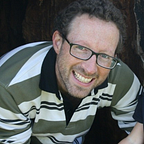Climate Action Fund — announcing the first cohort
2020 was supposed to be the ‘super-year’ for action on the environment globally and, although none of us could have predicted the depth and challenge of the Covid-19 crisis, the climate emergency is still as pressing as ever and it’s fantastic that the Climate Action Fund (CAF) has maintained momentum, sticking to its original stated timeframes for this year. That commitment is down to the leadership at the National Lottery Community Fund, and I’m grateful to have colleagues who are as passionate about this work as I am.
As we sifted through 630 initial ideas in January, it was clear to the CAF team that there was an incredibly high motivation in communities across the UK to tackle climate change. It was a real challenge (shared with a lot of funding colleagues) to sift through these ideas and find those with the closest match to what we were looking for. In the process, a number of ‘tensions’ were raised (more on this in a future post!), and we invited 40 of those organisations to submit a full application.
Along the way, we’ve been steered by lots of advice from colleagues within the Fund, by insights from experts in climate change, climate action and community, and by guidance from our amazing Advisory Panel. The CAF team then undertook a mammoth effort in assessment for these applications, including a range of peer reviews, as written up by my colleague Liz here. All this led to lively debate at an extended panel meeting with the Decision-Making Panel, who have been convened specifically for this funding programme.
The £14 million of grants announced today comprise eight development grants for emergent ideas (and/or partnerships) that need a bit more time to test and grow, and six larger scale full awards. The funding will support projects to work together in local partnerships, share learning and be catalysts for broader transformative change. Our learning from this first round of funding will help shape our next steps.
The official press release, including a full run-down of which projects are being funded (and how much) can be found here, but — in the meantime, here’s a flavour of some of the projects we’re announcing today:
Middlesbrough Environment City Trust will be using their £1.6 million of funding to empower young people to address climate change through educational workshops and individual climate action in their own communities.
The Women’s Environmental Network Trust, in partnership with London Leap has been awarded £2.1 million to run a range of community food projects to deliver a sustainable food system across Tower Hamlets in London including food growing, community gardens, food co-ops, and reducing plastic waste. The Network will create a community-led blueprint for grassroots food and environmental work to be shared with other London boroughs and cities across the UK.
Duchy College in Cornwall, has been awarded almost £1.3 million to run The Farm Net Zero project, which aims to help the farming community move towards net-zero carbon emissions. The project will create opportunities for farmers in Cornwall to learn about economically beneficial changes they can make to farming practice, through bespoke farm carbon footprint calculating, targeting soil health, peer-to-peer learning on effective action, and support networks for farmers and their surrounding communities.
The Community Foundation for Northern Ireland has been awarded £200,000 through a development grant. It will bring together the community of Derry/Londonderry to create local resilient local food systems by upskilling local people in food growing. This project is building on existing climate action work in the city, such as the Acorn Farm, which is a central hub for food growing and climate action education.
In Wales, a development grant of nearly £240,000 has been given to the Welcome to Our Woods project, which explores how the community can use its natural timber forest assets to create economic and social opportunities. The project will also look at how the local community can work and live, in a way which positively impacts the climate and reduces their carbon footprint.
